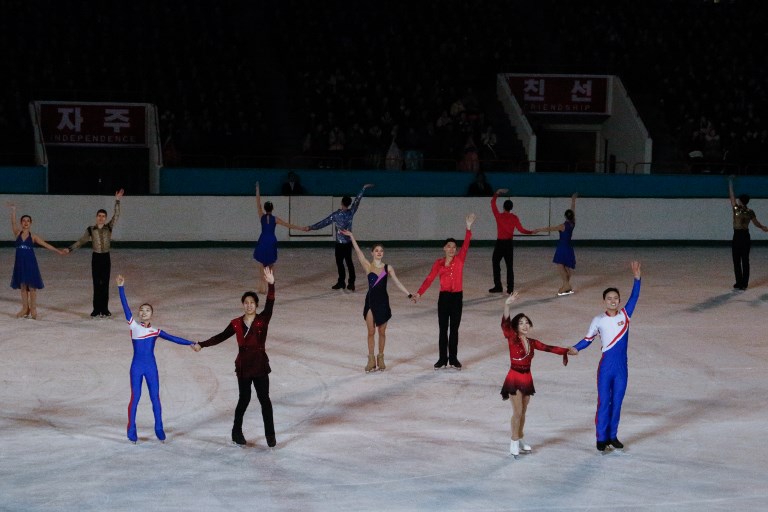North Korea and China in ice dance to the music of diplomacy

Ice skaters Ryom Tae Ok (front L) of North Korea stands with Han Cong (front 2nd L) of China as his partner Sui Wen Jing (front 2nd R) stands with Kim Ju Sik (front R) of North Korea during the ’26th Paektusan Prize Figure Skating Festival in Celebration of the Day of the Shining Star’ as part of celebrations marking the birthday of late North Korean leader Kim Jong Il, in Pyongyang on February 15, 2019. (Photo by Sebastien BERGER / AFP)
At the climax of a festival on ice to celebrate late North Korean leader Kim Jong Il on Friday, Olympic skaters from the host nation and neighboring China swapped partners to dance together.
The moment symbolized the markedly improved relations between Beijing and nuclear-armed Pyongyang amid a flurry of diplomacy on and around the peninsula.
The four skaters –- Ryom Tae Ok and Kim Ju Sik of the North, who qualified for last year’s Winter Olympics in the South, and Sui Wenjing and Han Cong, who took the ice dance silver in Pyeongchang –- were the star attractions of the pageant.
With portraits of Kim –- father and predecessor of current leader Kim Jong Un –- and his own father Kim Il Sung looking down on the arena, they smiled and waved together to the crowd at the end of the closing sequence.
A diplomatic dance resumes at the end of the month in Hanoi for a second North Korean-US summit, but in marked contrast to the speculation circulating in Washington and elsewhere, Pyongyang’s official KCNA news agency has barely mentioned the meeting.
Kim Jong Un had three summits with the South’s President Moon Jae-in last year and a historic first meeting with US President Donald Trump in Singapore.
The North has yet to announce the date to its own people, and KCNA last referred to the encounter three weeks ago, when it said that a special envoy Kim sent to Washington had “discussed the issue for the second DPRK-US summit”.
Vietnam’s foreign minister visited Pyongyang this week, but KCNA again skirted around the subject, saying he had “an in-depth exchange of opinions” on “regional and international issues of mutual concern”.
Pyongyang’s pursuit of nuclear arms and the ballistic missiles to deliver them to the US mainland has left it isolated on the global stage, subject to multiple sets of sanctions from the UN Security Council and other bodies.
But relations with China, long its key diplomatic protector and main provider of trade and aid, have improved markedly in recent months, with Kim keen to secure President Xi Jinping’s backing in his negotiations with Trump, and Beijing wary of Washington seeking to influence developments in its own back yard.
Kim went to China last month for his fourth encounter with Xi in less than a year, and in September Beijing sent a member of the Politburo Standing Committee, its most powerful political body, to attend a military parade in Pyongyang.
Juche on Ice
The ice skating show is part of the North’s annual festivities to mark the birth of Kim Jong Il, who it says was born on February 16, 1942, at a secret camp on Mount Paektu, the spiritual birthplace of the Korean people, where his father, the North’s founder Kim Il Sung, was fighting the Japanese.
Outsiders point instead to official Soviet records showing he was born a year earlier in a Siberian village, where the older Kim was in exile.
As well as scores of North Koreans ranging from Olympians to children, around 20 international skaters performed, mostly from eastern European countries.
In a welcome speech, a vice-minister described them as coming “to the festival stage with the feeling of humble respect for the great leader comrade Kim Jong Il, the eternal sun of Juche Korea”.
“Juche” is a North Korean political term which refers to self-reliance.
The North Koreans skated to songs such as “We cannot live without him” –- an ode to Kim Jong Un -– with the Olympic pair accompanied by “Confession”, about loyalty to the ruling Workers’ Party of Korea.
In contrast, a Belarussian took to the ice to Tina Turner’s GoldenEye, lyrics: “GoldenEye I found his weakness/GoldenEye he’ll do what I please”.